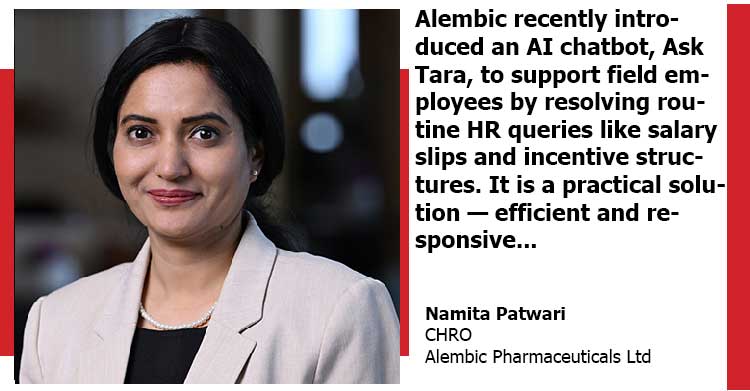Automation May Reply, But Only Humans Can Reassure | Namita Patwari | CHRO | Alembic Pharmaceuticals Ltd

In every era of transformation, we find ourselves at crossroads — one path lined with the promise of innovation, the other with the quiet insistence of connection. As artificial intelligence finds its way into the fabric of our everyday work, the question worth pondering is not whether it will change the way we operate, it already has. The deeper question is-what happens to the human soul of the workplace?
In today’s context, AI refers to intelligent digital systems designed to perform tasks traditionally requiring human cognition, from answering queries to forecasting patterns. Human touch, on the other hand, is not simply about interpersonal interaction; it is the ability to offer empathy, intuition, and context — qualities that foster trust, build culture, and hold space for human complexity. These are not opposites. They are forces that must
work in tandem.
Alembic recently introduced an AI chatbot, Ask Tara, to support field employees by resolving routine HR queries like salary slips and incentive structures. It is a practical solution — efficient and responsive. Yet, even as its impact is being felt, it quietly reinforces a powerful truth: the more seamless our systems become, the more irreplaceable the human dimension feels.
1. Information Is Not the Same as Insight
AI can respond with precision, but what people really look for is to feel heard. When someone reaches out to HR, it is not always about the question they ask. Sometimes, it is about what they are not saying. A query about leaves could be masking burnout. A doubt about a policy might actually be a cry for fairness.
Technology can respond. But only humans can listen in the true sense with context, compassion, and curiosity.
2. Precision Can’t Replace Presence
AI will never forget a name, but it will also never notice the tremble in a voice. It will not pick up on discomfort. It will not read the room, and it certainly will not pause to ask, “Are you okay?”
Real trust is not built on accuracy. It is built on presence. Being there. Showing up. Staying a little longer in the conversation. HR’s responsibility is not only to resolve issues, but also to ensure that people know they are not navigating through situations alone.
3. People, Not Just Processes
HR works with what’s real — and people aren’t just data. They come with emotions, experiences, and different life journeys. They bring emotions, hesitations, personal histories, and uncertain futures. Systems might handle 80% of queries, but the remaining 20% — human nuance, emotion, and context converge — is where the real work begins. Technology frees up time and removes the clutter. What we choose to do with that freedom will define the future of HR.
4. Culture Grows in Conversations, Not in Code
Tasks can be automated, trust cannot. Policies can be digitised. Belonging cannot. Culture is not built in dashboards or data sets. It lives in everyday moments: when a manager truly listens, when HR goes the extra mile, when someone is seen and heard without an agenda. AI may provide structure, but human interaction brings soul. And without soul, no system, however advanced, can inspire loyalty or create belonging.
5. Empathy Is Still Our Greatest Advantage
AI is logical. But work is not always. Decisions are shaped by values, identities, stories, relationships. The leaders of tomorrow will have to pair data with discernment, algorithms with intuition, automation with empathy.
Ironically, AI’s rise places even greater value on distinctly human traits. The HR function is being called back to its core — not just to deliver results, but to carry responsibility. To create environments where people feel safe, seen, and supported.
As organisations integrate AI deeper into their frameworks, the temptation will be to let it take over more and more. Let AI handle the routine. People should focus on what truly matters.
The question is not whether AI will redefine work. It already has. The real question is whether the human spirit will continue to shape the why, the how, and the who behind that work. Because in the end, no matter how intelligent machines become, it is only human beings who can understand what it means to be human.


